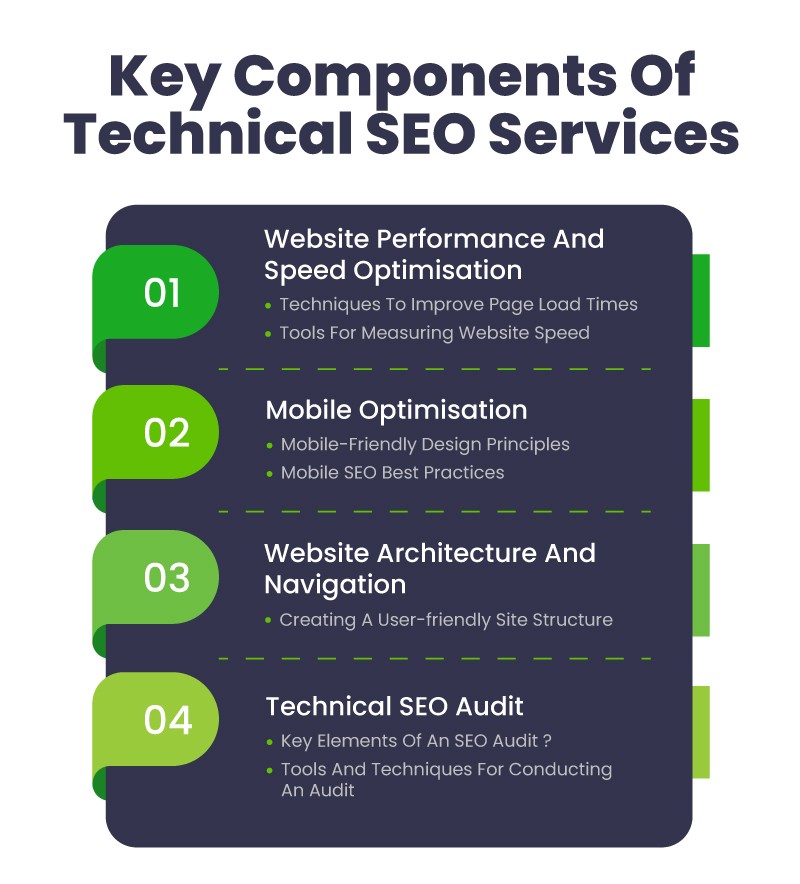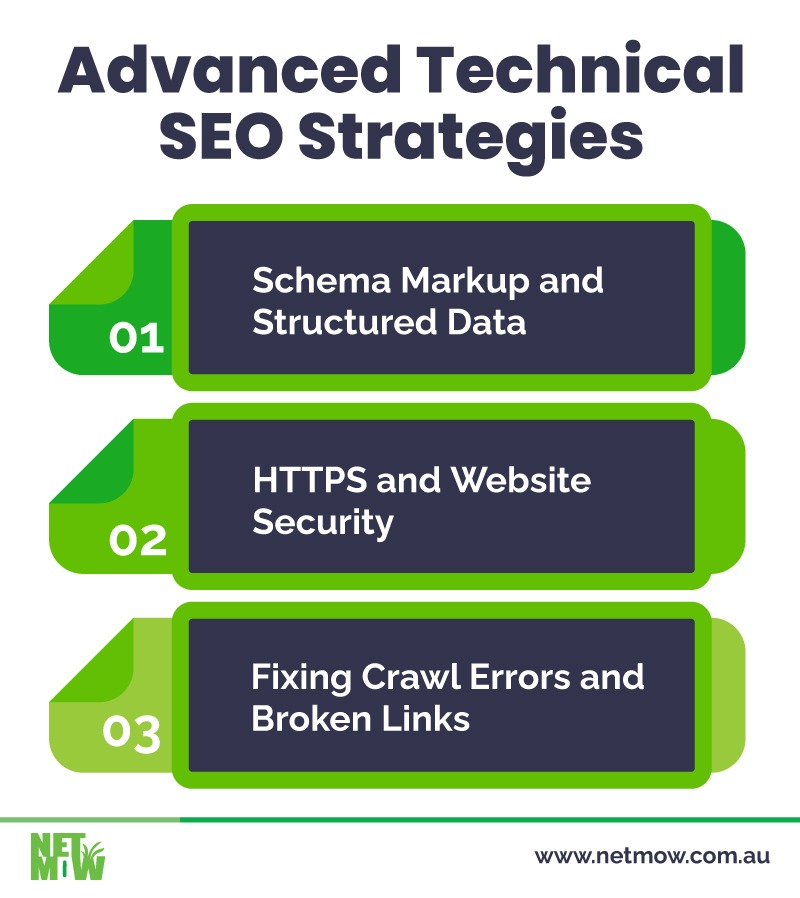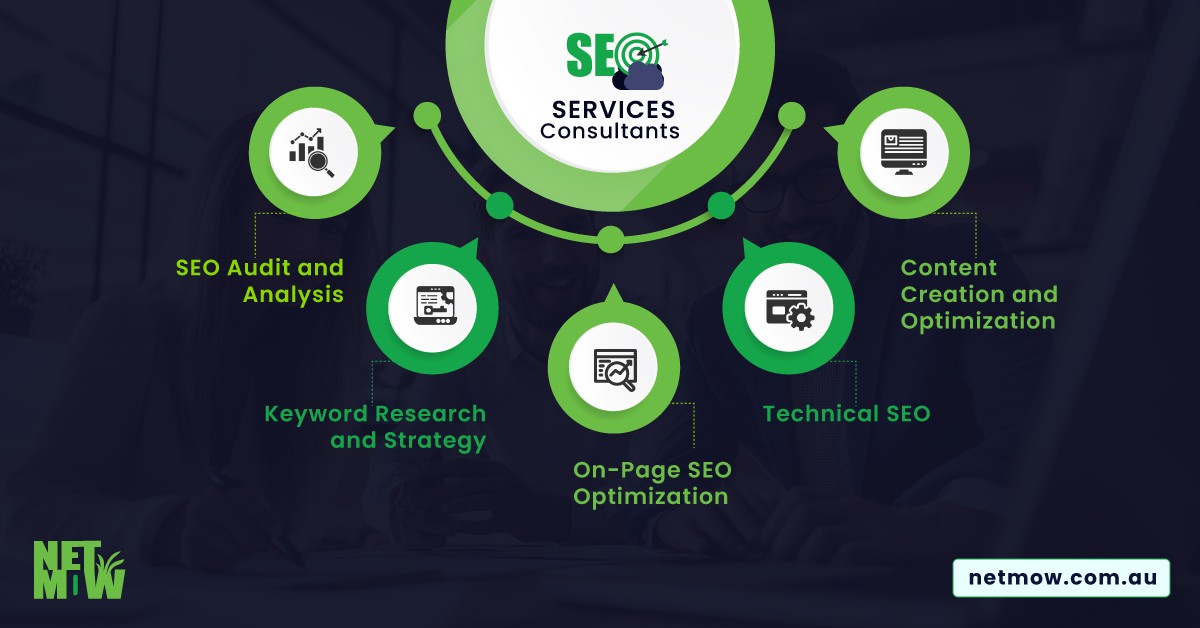
In today’s digital landscape, technical SEO is crucial for optimising your website’s performance and visibility. It goes beyond content and backlinks to address backend elements that affect your site’s crawlability, indexing, and ranking. Choosing the right technical SEO service provider is essential to overcome these challenges effectively.
This guide covers the essential elements to consider and explains why Netmow is your ideal partner for technical SEO success.
What is Technical SEO?
Technical SEO optimise a website’s infrastructure to enhance its visibility and effectiveness on search engines. It involves site speed, mobile-friendliness, indexing, crawlability, and site architecture. These elements guarantee that search engines can effectively reach, interpret, interpret, and rank your content. Without a robust technical foundation, even the best content may struggle to rank effectively.
Why Technical SEO Matters for Your Website
Technical SEO is vital for several reasons:
- Impact on Search Rankings: Effective technical SEO helps search engines understand and rank your content. Issues like slow load times or poor mobile optimisation can negatively affect rankings.
- User Experience: A well-optimised site enhances user experience, leading to better engagement, lower bounce rates, and higher conversions. Technical issues like broken links or sluggish loading times can frustrate users.
- Improved Crawlability and Indexing: Technical SEO ensures that search engines can effectively navigate and index your website, making your content more accessible and improving its chances of ranking.

Key Components of Technical SEO Services
Website Performance and Speed Optimisation
Website performance and speed optimisation are crucial aspects of technical SEO services. A swiftly loading website enhances the user experience and helps improve search rankings, as Google considers page speed a key ranking factor.
Techniques to Improve Page Load Times:
- Image Optimisation:
- Browser Caching:
- Set Expiry Dates: Configure your server to set expiry dates for static resources, reducing load times for repeat visitors.
- Leverage Caching Plugins: Use plugins for CMS platforms like WordPress to enhance performance.
- Code Minification:
- Content Delivery Network (CDN):
- Use a CDN: Distribute content across multiple servers worldwide to reduce latency and speed up content delivery.
Tools for Measuring Website Speed:
- Google PageSpeed Insights: This tool offers detailed insights and actionable recommendations for performance improvements. By analysing various performance metrics, PageSpeed Insights helps you understand how to optimise your website effectively.
- GTmetrix: GTmetrix provides a comprehensive analysis of your site’s speed and performance. It delivers actionable suggestions to enhance load times and overall site efficiency.
- Pingdom: Pingdom offers an in-depth analysis of load times and performance metrics, helping you identify areas for improvement to boost your site’s speed and user experience.
Mobile Optimisation
Given the increase in mobile device use, optimising your site for mobile is essential for both user experience and search engine rankings.
Mobile-Friendly Design Principles:
- Responsive vs. Adaptive Design:
- Responsive Design: Utilises fluid layouts and adaptable images to accommodate different screen sizes, delivering a smooth experience across all devices.
- Adaptive Design: Serves different layouts based on device detection but requires separate versions of your site.
- Touch-Friendly Navigation:
- Optimise Buttons and Links: Ensure touch targets are large enough for easy tapping.
- Readable Text Without Zooming: Use legible font sizes to avoid the need for zooming.
- Viewport Configuration:
- Set Viewport Meta Tag: The viewport meta tag controls layout scaling on mobile browsers.
Mobile SEO Best Practices:
- Test Mobile Friendliness: Use Google’s Mobile-Friendly Test tool to evaluate mobile performance.
- Optimise Mobile Loading Speed: Enhance mobile page speed by optimizing images and using AMP (Accelerated Mobile Pages) if applicable.
Website Architecture and Navigation
A well-organised website architecture improves both user experience and search engine indexing.
Creating a User-Friendly Site Structure:
- Logical Hierarchy:
- Organise Content: Use categories and subcategories for a clear content hierarchy.
- Breadcrumb Navigation:
- Implement Breadcrumbs: Provide a trail of links showing the user’s location within the site.
- Internal Linking:
- Use Descriptive Anchor Text: Link-related content with descriptive text to improve crawlability and distribute link equity.
- XML Sitemaps:
- Create and Submit Sitemaps: Generate an XML sitemap and submit it via Google Search Console or Bing Webmaster Tools.
- Importance of Internal Linking:
- Enhances Crawlability: Helps search engines discover and prioritise pages.
- Improves User Navigation: Provides easy access to related content, encouraging exploration of more pages.

Advanced Technical SEO Strategies
Schema Markup and Structured Data
Schema Markup is structured data that helps search engines better understand your site’s content, leading to enhanced search results with rich snippets.
Benefits:
- Rich Snippets: Display star ratings, prices, and other details directly in search results, increasing visibility and click-through rates.
- Improved User Experience: Provides users with relevant information at a glance.
Implementation:
- Choose the Right Schema: Select the appropriate schema type (e.g., Article, Product, Event) from Schema.org.
- Use JSON-LD: Implement schema markup using JSON-LD for simplicity and compatibility.
- Test: Validate your markup with Google’s Structured Data Testing Tool.
HTTPS and Website Security
HTTPS is crucial for securing your site, protecting user data, and improving search rankings.
SEO and Security:
- Ranking Factor: HTTPS is a known Google ranking signal.
- User Trust: Encrypts data, protecting sensitive information and avoiding browser security warnings.
Implementation:
- Obtain SSL: Choose a reputable Certificate Authority (CA) and install an SSL certificate.
- Update URLs: Change site URLs to HTTPS and implement 301 redirects from HTTP to HTTPS.
Additional Security:
- Security Audits: Regularly check for vulnerabilities.
- Secure Login Pages: Use two-factor authentication (2FA) for added security.
Fixing Crawl Errors and Broken Links
Crawl errors and broken links prevent search engines from indexing your site properly. Regular maintenance is essential.
Identifying and Fixing Errors:
- Monitor with Google Search Console: Identify crawl errors like 404s and server issues.
- Resolve Issues: Fix broken links and correct server errors promptly.
Handling Broken Links:
- Identify: Use tools like Screaming Frog to find broken links.
- Redirect: Implement 301 redirects and update internal links to validate pages.
- Routine Maintenance: Regularly check for new errors or broken links to maintain a healthy site.
Technical SEO Services Offered by Netmow
Our Approach to Technical SEO
At Netmow, we deliver customised technical SEO services to enhance your website’s performance, search engine rankings, and user experience.
Technical SEO Process Overview:
- SEO Audit and Analysis:
- Site Health Check: Conduct a thorough audit to evaluate site speed, mobile responsiveness, and security. This includes a detailed technical SEO audit checklist to identify critical areas needing improvement.
- Competitive Analysis: Evaluate competitors to identify opportunities for your site.
- Technical Optimisation:
- Customised Strategy: Tailored SEO plan addressing site speed, schema markup, and HTTPS security.
- Implementation Timeline: Prioritised schedule for implementing changes.
- On-Page Optimisation:
- Meta Tags and Headers: Optimise meta titles, descriptions, and headers for targeted keywords.
- Content Optimisation: Ensure content is user-friendly and optimised by search engines.
- Monitoring and Reporting:
- Regular Monitoring: Track site performance using tools like Google Analytics and Search Console.
- Detailed Reports: Regular updates on key metrics, including site speed and rankings.
- Ongoing Optimisation:
- Continuous Improvement: Regular updates based on SEO trends and algorithm changes.
- Client Support: Ongoing assistance to keep your SEO strategy effective.
Custom Solutions Tailored to Your Business
Netmow offers personalised technical SEO solutions that address your needs and business goals.
Custom Solutions Include:
- Personalised Audits: Tailored audits focused on your industry and business.
- Bespoke Plans: Custom optimisation strategies for your site’s unique challenges.
- Flexible Strategies: Adaptable plans that evolve with your business.
How to Choose a Technical SEO Service Provider
Selecting the right technical SEO service provider is crucial for optimising your website’s performance. Here’s a guide to help you choose wisely.
What to Look for in a Technical SEO Agency
Proven Experience
- Track Record: Seek agencies with a history of successful technical SEO projects, demonstrated through case studies.
- Industry Expertise: Choose an agency familiar with your industry’s specific challenges.
Technical Knowledge
- Comprehensive Skills: Ensure the agency excels in all aspects of technical SEO, including site speed, crawl errors, schema markup, and security.
- Up-to-date Knowledge: The agency should stay current with SEO trends and algorithm changes.
Transparent Processes
- Clear Methodology: The agency should provide a detailed process outline, from audits to strategy development and results measurement.
- Regular Reporting: Look for detailed progress reports and performance metrics.
Client-Centric Approach
- Customised Solutions: The agency should tailor its strategies to your business needs.
- Support and Communication: Ensure they offer ongoing support and maintain clear communication.
Questions to Ask Potential Providers
- What is your approach to technical SEO?
- Assess their methodology for alignment with your business needs.
- Can you provide case studies or references?
- Evaluate their effectiveness through past projects and client feedback.
- How do you measure success?
- Understand their key performance indicators (KPIs) and metrics.
- What tools and technologies do you use?
- Gauge their technical capabilities.
- How do you keep up with SEO updates?
- Ensure they keep pace with industry updates.
Why Netmow is Your Ideal Choice
Expertise and Experience
- Comprehensive Skill Set: Our team excels in all technical SEO aspects, ensuring optimal website performance.
- Proven Results: We have a proven history of enhancing search rankings, traffic, and site performance.
Commitment to Results
- Tailored Strategies: We customise SEO plans to align with your goals.
- Data-Driven Decisions: Our strategies are informed by data and analytics.
- Ongoing Optimisation: We continuously refine strategies to adapt to SEO trends.
Common Questions About Technical SEO Services
How Long Does it Take to See Results from Technical SEO?
- Initial Improvements (1-3 Months): Quick wins like fixing broken links or improving site speed can immediately improve performance metrics.
- Moderate Changes (3-6 Months): More extensive efforts like restructuring site architecture take a few months to reflect in search rankings and traffic.
- Long-Term Results (6-12 Months): Major changes, such as overhauling site infrastructure, may take up to a year to produce significant results.
- Continuous Monitoring: Regular evaluations ensure ongoing compliance with SEO best practices and adjust to algorithm changes.
How Often Should I Perform a Technical SEO Audit?
- Quarterly Audits (Every 3 Months): Ideal for dynamic sites updating content or features frequently.
- Biannual Audits (Every 6 Months): Suitable for stable sites with infrequent updates.
- Annual Audits (Once a Year): Best for smaller or less frequently updated sites; should be comprehensive.
- Special Circumstances: Conduct after major site changes or significant algorithm updates.
Conclusion
Technical SEO ensures your website performs optimally and ranks well in search results. Technical SEO enhances user experience and search engine visibility by improving site speed, fixing crawl errors, and implementing advanced schema.
At Netmow, we specialise in technical SEO for businesses, providing tailored solutions to meet your unique needs. Our experts are committed to optimising your website’s technical aspects, ensuring sustained and impactful results.
Don’t let technical issues hinder your website’s potential—partner with Netmow to leverage our technical SEO expertise.
Visit our website at Netmow or call us at +61 477 937 937 to schedule a consultation.
Related Article

The Ultimate Technical SEO Guide: Boost Your Site’s Speed, Security, and Search Rankings

The Power of Technical SEO for Businesses in Gold Coast

Technical SEO Audit Checklist to Grow your Business Faster










